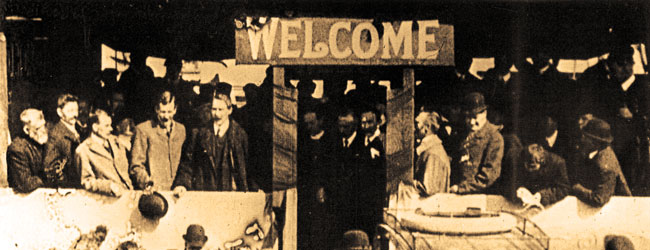5 January 2012
The Tories stir sectarianism in Ireland

Andrew Bonar Law (left of ‘Welcome’ banner), the new leader of the Tories at Balmoral, Belfast, in April 1912
THE YEAR 2012 marks the centenary of the escalation of what was known as the Home Rule crisis during which the opposition Conservative & Unionist Party in Britain ruthlessly stoked Ulster unionist sectarianism. The Tories went so far as to threaten civil war in order to topple the Liberal Government and to prevent any measure of even limited Irish autonomy.
After two general elections in 1910, the British Liberal Party governed with the support of the Irish Party in Westminster and was pledged to introduce a Home Rule Bill. This was bitterly opposed by the Tories, especially in the House of Lords, a bastion of British wealth and privilege. When the Lords repeatedly used their power of veto to block Liberal Government measures, including budgets, the Government hit back by appointing a raft of Liberal peers to the House and, in August 1911, passed the Parliament Act. This meant that in future the Lords could only delay a Bill for two years.
The Tories responded by stepping up their support for unionists in Ulster. In September 1911, Edward Carson was welcomed as leader of the unionists at Craigavon, mansion of Captain James Craig. “We must be prepared, the morning Home Rule passes, ourselves to become responsible for the government of the Protestant province of Ulster,” declared Carson.
Two days later, in Belfast, 400 unionist and Orange Order delegates adopted a plan to establish a ‘Provisional Government of Ulster’ and “not to submit to Home Rule”. At a rally in Portrush the next day, Carson produced a telegram sent to him by a commander in the Royal Navy offering his services and he claimed this was far from an isolated case.
One of the most vocal and provocative opponents of Home Rule was FE Smith (later Lord Birkenhead), the Tory MP for the Liverpool constituency of Walton. From a privileged background, Smith was hugely wealthy, making over £10,000 per year as a barrister, an enormous sum at the time. He enjoyed high living and was renowned for his sharp tongue and political cynicism. He saw the Home Rule crisis as a golden opportunity to advance his personal ambition and that of his party.
Speaking in Liverpool in January 1912, Smith said there was “no length to which Ulster will not be entitled to go - however desperate and unconstitutional - in carrying the quarrel if the quarrel is wickedly fixed upon them”. This was the first of a series of ever more violent speeches by Smith throughout 1912. Also in January he said “violence and bloodshed in Ulster would be an incomparably smaller misfortune than cowardly acquiescence” in Home Rule.
At this time, Winston Churchill - later an ally of Smith - was First Lord of the Admiralty in the Liberal Government and he was booked to speak at a Home Rule meeting in the Ulster Hall in February 1912. Armed unionists took possession of the hall and prevented the meeting from going ahead. It was held instead in Celtic Park in west Belfast.
The unionists ratcheted up the crisis throughout the year. In April, at Balmoral in Belfast, 150,000 men in military formation marched past Andrew Bonar Law, the new leader of the Tories. That same month, the Home Rule Bill was introduced and it passed its second reading in May.
The words of Carson, Craig, Bonar Law and Smith led to violence. With sectarian tension rising during the Orange marching season, in July 1912 in Belfast over 2,000 people were driven out of their work in Harland and Wolff’s shipyard, the Workman Clark yard and other places of employment. Most were Catholics but they included some hundreds of Protestants deemed politically undesirable by the sectarian unionist instigators.
Speaking on the Twelfth of July in Belfast, Smith praised the military preparations of the Orangemen: “I note with satisfaction that you are preparing yourselves by the practice of exercises and by the submission to discipline for the struggle.”
At a mass rally of unionists at Blenheim in England, Smith urged Carson to appeal to “the young men of England” to fight for the unionists in Ulster. Arms were already being imported to Ulster at this time, six months before the formal establishment of the Ulster Volunteer Force in January 1913. In the meantime, the Solemn League and Covenant (September 28th 1912) was signed by an estimated 250,000 men.
Smith became one of the chief recruiters and cheer-leaders for the UVF, appearing at rallies mounted on a horse and earning himself the name ‘The Galloper Smith’. At a County Antrim UVF parade he said they were “dealing with a Government which understands one argument - the argument of force”.
When Roger Casement was put on trial for treason in London in 1916, his chief prosecutor was FE Smith who had risen to become Attorney General for England and who would go on to become Lord Birkenhead, Lord Chancellor of England, presiding in the House of Lords, where his seat was known as ‘the woolsack’. In his speech from the dock, Casement referred to the Tory rebellion of a few short years before and Smith’s role in it:
“The difference between us was that the unionist champions chose a path they felt would lead to the woolsack, while I went a road I knew must lead to the dock.”
• The Tory unionist revolt against Home Rule was escalated in January 1912, 100 years ago this month.
Follow us on Facebook
An Phoblacht on Twitter
Uncomfortable Conversations

An initiative for dialogue
for reconciliation
— — — — — — —
Contributions from key figures in the churches, academia and wider civic society as well as senior republican figures




